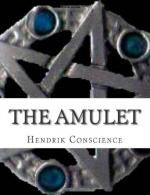“I have lived here many years,” replied Turchi. “These gentlemen are frequent visitors at the house of Mr. Van de Werve, and I have seen them so often, that I know them as old friends. Look at the corner near the piano, where those collected together laugh merrily, jest, and chat socially. You may easily recognize them by their light playful manners as artists.”
“Yes. Is not that handsome man with noble features Frans Floris, the Flemish Raphael?”
“Yes; he was presented to you yesterday by Mr. Van de Werve, and you may remember how enthusiastically he eulogized Italian art.”
“Near him is a singular-looking person; his very attitude is amusing, and his gestures force one to laugh.”
“He is Peter Breughel, a humorist, who so designs his pictures that they seem painted only by way of jest. He is, however, in good repute as an artist. I saw recently one of his pictures in which he represents the Saviour carrying his cross to Calvary. In this he represents pilgrims with their staves, Spanish soldiers in doublets, monks and nuns; there is even a statue of the Blessed Virgin suspended on a tree, and that at a time when there was no Christianity, no Saint James of Compostella, neither convents nor Spaniards.”
“That is indeed singular,” said Deodati, smiling. “It seems to me that such conceits do but very little honor to the artist. Is it a custom among other artists in the Netherlands to sport thus with holy things?”
“No; Signor Breughel is an exception. The other gentlemen in company with the Flemish Raphael are more serious men. Michael Coxie, whom you may distinguish by the gray doublet, excels in his portraits of women. The handsome young man standing behind him is Martin de Vos, a pupil of Floris; he evinces a high order of talent and gives promise of great perfection in his art. The others, as well as I can recognize them at this distance, are Lambert Van Noord, Egide Mostaert, William Key, Bernard de Rycke, and the two brothers Henry and Martin Van Cleef, all celebrated historical, fancy, or portrait painters. Near them is Master Grimmer, a famous landscape-painter; and the gentleman now speaking is a certain Ack of Antwerp, who has painted the large glass windows of the church of Saint Gudula at Brussels. The old man sitting apart near the piano is Christian; he has marvellous skill in playing on many instruments, but he excels most on the violin. You will probably hear him this evening.”
Simon Turchi continued to converse familiarly with the Signor Deodati, who was charmed with his intelligence, but still more with the kind consideration which made him refrain from joining in the general conversation in order to entertain an old man.
Geronimo had several times approached his uncle, but each time the latter had playfully sent him away, telling him that the agreeable company of the Signor Turchi sufficed for him, and that he preferred a quiet conversation.




